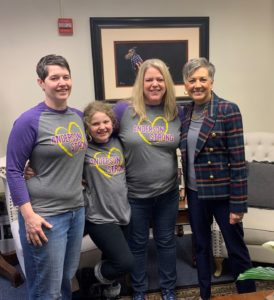
Christine Johnson-Sundby, Rene Sundby and their daughter Ellie made a point of being here for the Senate vote on the Tiffany Hill Act today; Rene (right) is PTA president at Anderson Elementary and met Tiffany through her children; she offered powerful testimony in support of the bill two weeks ago.
Hello Friends and Neighbors,
Today marks the end of the third week of our nine-week legislative session at the Capitol. Most of our work will continue to take place at the committee level for another week or so, before we move to the floor of the Senate chamber for an extended period of voting. However, the full Senate has already met several times to cast votes and send legislation over to the House of Representatives.
Some of those votes took place today – and one brought the unanimous passage of the Tiffany Hill Act! Click here for more about the bill and what’s next; the video of today’s vote begins here.
Another increase in the business tax?
One of the other bills voted on by the full Senate this week would impose a 17% business-tax increase. That’s not on top of the dozen tax hikes approved in 2019, but is a replacement for one of them. Still, it isn’t good news for the employers who will be hit.
We knew before coming to the Capitol for this year’s session that there were fatal flaws in the the business-and-occupation tax increase approved in 2019. It slapped providers of professional services (veterinarians and accountants are good examples) with a 20% increase. The Department of Revenue told us that back in November.
Considering the tax increase wasn’t needed in the first place, just like the others adopted by the majority last year, and voters were strongly opposed to it on the November advisory ballot (62.6% “no”) I would have preferred for the majority to simply repeal the unworkable tax. Instead, a replacement was approved that somehow manages to take in a new set of providers (people who treat substance-abuse disorders, for instance) and will hand $500 million to government instead of $400 million. Why would they do that, and do they really think people will buy the claim that repealing a 20% increase (House Bill 2158) and enacting a 17% increase (SB 6294) qualifies as a tax reduction?
Unfortunately it’s almost assured that the House will also approve the change. If there’s any silver lining, it’s that the new increase could be in place before these businesses have to pay their next round of taxes.
A 32-hour work week…and money for nothing
Every session brings bills that cause some head-shaking, and here are a few for 2020: a proposal for a 32-hour work week, another that would give $500 a month (each) to 500 low-income adults as “basic income,” with no strings attached, for 18 months. The third would let employees place liens against their employers over wage disputes.
The sponsor of SB 6516, the shorter work week, is a Democrat senator from West Seattle who comes from the tech industry, and his idea might have a chance in that sector – but the requirement to pay time-and-a-half beyond 32 hours would be too much for most employers. Between taxes and regulations, don’t they have enough pressure as it is?
The same senator is also proposing the basic-income bill, SB 6625. If that sounds like nothing more than free money, with no accountability, on top of any other public assistance the 500 people receive, it sounds that way to me also. The idea is similar to a pilot project under way in Stockton, Calif. I realize state government is in good financial condition, but if the Legislature wants to put money toward something, how about doing more to deal with the backlog of families seeking services for their developmentally-disabled loved ones?

Between committee meetings and votes in the Senate chamber I appreciated being able to meet with representatives of the ports of Vancouver, Ridgefield and Camas-Washougal: (from left) Sean Philbrook, Dave Ripp, Ryan Hart, Bruce Wiseman, Casi Marshall, and Brent Grening.
The idea of wage liens (SB 6053) sounds like yet another of those solution-in-search-of-a-problem bills we see regularly. Washington already has a state agency to handle wage complaints (Labor & Industries). Also, there are already enough frivolous lawsuits – how could employers protect themselves against frivolous wage liens?
Updates on other bills I’m sponsoring:
- My Senate Bill 6042 hasn’t moved – and that’s a disappointment, because policy committees have one more week to act on bills. My bill to prohibit the use of “title-only” bills needs to get both a public hearing and a vote from the Senate’s state-government committee no later than February 7, or else the bill is considered “dead” for the year.The committee had time today to act on a bill to make the Pacific razor clam the official state clam of Washington; does it not have time to help make government more transparent by doing away with bills that keep the public in the dark with their vague titles and lack of content?
- SB 6044, which I’m calling the “Three Branches Act,” has also gotten a chilly reception from the state-government committee. That’s a disappointment because this bill would fundamentally improve the way regulations are made in support of laws, in a way that is not at all partisan.
- SB 6402 – My bill to increase the penalty for stealing a gun was advanced last week by the Senate Law and Justice Committee. This was the day after the multiple shootings in downtown Seattle – which I’ll bet involved stolen guns. It’s now on deck for a vote by the full Senate.
- SB 6464 – This would allow legislators appointed to the State Building Code Council to cast votes. It has cleared two committees and now is a step away from the Senate’s voting calendar.
- SB 6043 – There are associations that offer legal assistance plans as a membership benefit, and to make a long story short, I have a constituent who ended up in a serious dispute with the state Office of the Insurance Commissioner over such a plan. This bill would clarify the law regarding what are officially known as “subscription service” legal defense funds, to hopefully prevent any further complaints by the insurance commissioner. The bill had a hearing in our Law and Justice committee yesterday and could be voted on Thursday.
- SB 6538 – Should the status of a nurse’s license to practice be threatened in any way if the nurse doesn’t want to participate in government-sanctioned surveys that have no connection to the practice of nursing? I don’t think so either, and this constituent-driven bill is the result. There also are privacy implications, and I’ll cover all of it when the bill has a hearing before the Senate health-care committee on Monday (with a vote possibly coming Wednesday).
- SB 5147 – It isn’t right that women have to pay sales tax on feminine-hygiene products, and the tax adds to the burden on low-income women. These are medically necessary items, not optional. I’ve been sponsoring this legislation for five years now and am pleased that it’s getting a new level of attention – especially from the news media. The bill is still awaiting a vote from the Senate Ways and Means Committee, but it had a public hearing on Monday. That’s progress!
Yours in service,











